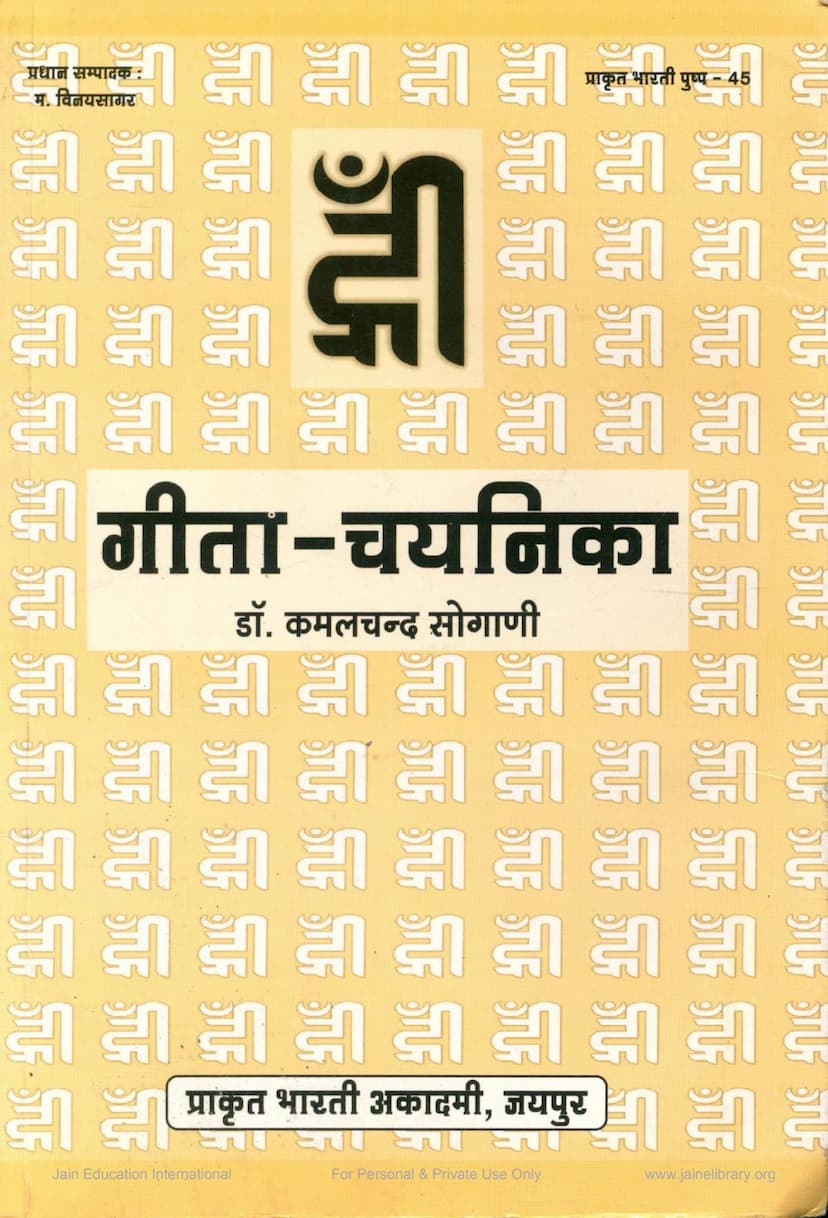Geeta Chayanika
Added to library: September 1, 2025

Summary
This comprehensive summary of "Geeta Chayanika" by Dr. Kamalchand Sogani, published by Prakrit Bharti Academy, Jaipur, is based on the provided pages of the text.
Book Title: Geeta Chayanika (A Selection of Verses from the Bhagavad Gita)
Author: Dr. Kamalchand Sogani (Former Professor, Department of Philosophy, Mohanlal Sukhadia University, Udaipur)
Publisher: Prakrit Bharti Academy, Jaipur
Overview: "Geeta Chayanika" is a meticulously curated selection of 170 verses from the Bhagavad Gita, presented with Hindi translations and detailed grammatical analysis. The book aims to make the profound philosophical teachings of the Bhagavad Gita accessible to a wider audience, including scholars and general readers alike. Dr. Sogani's work is characterized by its unique approach to not only translating but also providing a deep understanding of the Sanskrit verses through linguistic examination.
Key Features and Content:
-
Selection of Verses (Pages 2-61): The core of the book is the selection of 170 shlokas from the Bhagavad Gita. Dr. Sogani has chosen verses that represent the fundamental philosophical thoughts of the Gita, aiming to capture its essence. The selection is presented with their Hindi translations, which are noted for their originality and adherence to the spirit of the original text.
-
Grammatical Analysis (Pages 64-128): A significant and distinctive feature of this work is the detailed grammatical analysis of each selected verse. Dr. Sogani employs an original symbolic system (explained in the "Sanket-Suchi" on pages 62-63) to dissect the words, their roots, grammatical forms (verb conjugations, noun declensions, case endings, etc.), and sentence structure. This analysis is intended to aid readers in understanding the linguistic nuances and the inherent meaning of the Sanskrit words. This method is praised for its usefulness in systematically learning Sanskrit and understanding grammatical rules.
-
Introduction and Philosophical Exposition (Pages 18-37): The "Prastavana" (Introduction) by Dr. Kamalchand Sogani delves into the broader context of human consciousness, the evolution from object-centric to value-centric awareness, and the significance of ethical and spiritual values. It highlights the Gita's core message of establishing a society based on these values. The introduction discusses:
- Divine vs. Demonic Qualities: The book emphasizes the Gita's teaching on cultivating divine qualities (like self-control, honesty, non-violence, truthfulness, forgiveness, patience) and abandoning demonic tendencies (like lust, arrogance, cruelty, greed).
- Karma Yoga vs. Sannyasa Yoga: A significant portion of the introduction is dedicated to explaining and comparing Karma Yoga (action without attachment to results) and Sannyasa Yoga (renunciation of action). Dr. Sogani argues that Karma Yoga, which involves continued engagement in selfless action for the welfare of the world, is superior to Sannyasa Yoga, as it provides practical guidance and inspiration for society.
- The Ideal Yogi: The text describes the ideal yogi as someone who, after achieving self-realization, remains engaged in selfless service (lokasangraha). This yogi is characterized by detachment, equanimity, inner peace, and a profound understanding of the interconnectedness of all beings.
- Paths to Self-Realization: The introduction outlines the various paths to spiritual realization discussed in the Gita, including Karma Yoga, Bhakti Yoga (devotion), and the pursuit of equanimity (Samatva) and transcendence of the gunas (Gunatit).
- The Importance of Practice and Renunciation: The text stresses that while full detachment is achieved after self-realization, even partial practice of detachment can alleviate mental distress. The path of sadhana involves discipline, renunciation, practice, and devotion.
-
Endorsements and Testimonials (Pages 12-17): The book includes "Sammati" (Endorsements) from respected scholars, Professor Dr. Mulchand Pathak and Professor Dr. Ramchandra Dwivedi, and Acharya Dr. Dayanand Bhargava. These endorsements highlight the book's unique contribution to Gita studies, commending Dr. Sogani's innovative approach to translation and grammatical analysis, and emphasizing the universal relevance of the Gita's teachings. They particularly praise the emphasis on the universally acceptable form of the Gita, transcending sectarian interpretations.
-
Dedication (Page 4): The book is dedicated to the spiritual inspiration of the late Dr. Ramchandra Dattatraya Ranade and the late Master Motilalji Sanghi (Founder, Shri Sanmati Library, Jaipur).
-
Acknowledgments (Pages 43-44): Dr. Sogani expresses his gratitude to various individuals and institutions, including S.K. Belvalkar for the edition of the Bhagavad Gita used, and his colleagues and family for their support. He also thanks Prakrit Bharti Academy for their efforts in publishing the book.
Unique Contributions:
- Grammatical Analysis of Sanskrit Verses: This is the most prominent unique feature. The detailed breakdown of Sanskrit grammar for each verse makes complex texts accessible to those with an interest in linguistic and philosophical study.
- Cross-Cultural Philosophical Synthesis: While Dr. Sogani's previous works focused on Jain scriptures, this selection from the Bhagavad Gita demonstrates his ability to engage with and interpret texts from diverse spiritual traditions, advocating for a unified search for truth.
- Emphasis on Practical Application: The book aims not just at theoretical understanding but at enabling readers to apply the Gita's ethical and spiritual principles in their daily lives.
Overall Purpose:
"Geeta Chayanika" serves as a valuable resource for students, scholars, and anyone seeking a deeper, more nuanced understanding of the Bhagavad Gita. Through its rigorous linguistic analysis and thoughtful philosophical exposition, the book bridges the gap between ancient wisdom and contemporary understanding, offering a path to moral and spiritual growth.